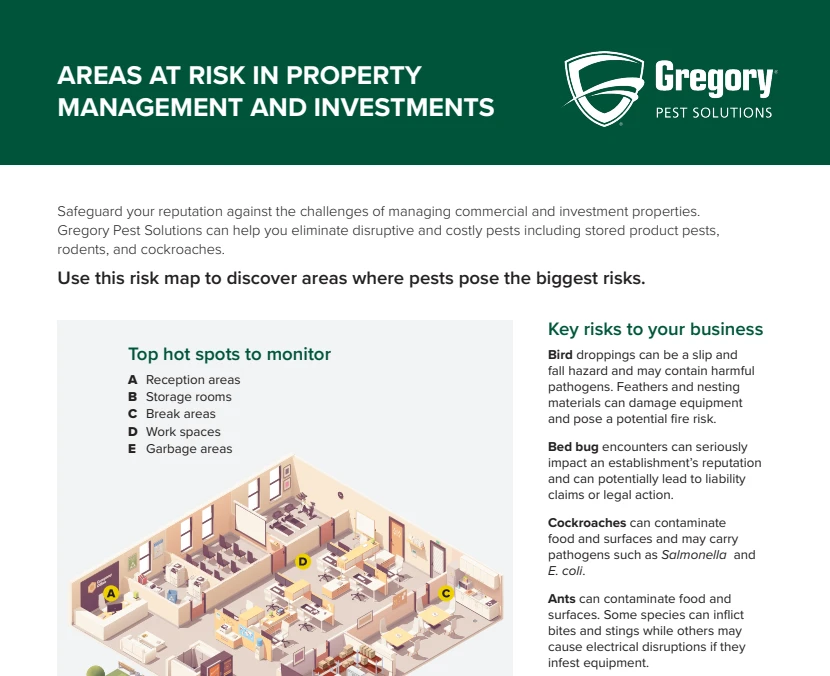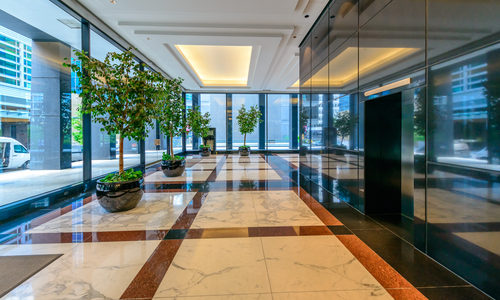American businesses lose millions of dollars annually when employees are exposed to disease because of insects and rodents. Insects also damage equipment and buildings. A healthy, pest-free workplace is a key to productivity, profitability, and a positive company image.
Our company offers property management pest control to offices and other facilities throughout South & North Carolina. We inspect, identify pest problems and the causes, and then apply a safe treatment control strategy until all pests have been eliminated. Gregory Pest Solutions will work as your partner to alleviate pest problems and make your workplace a healthier, protected, and more productive place for all employees.
Pest control is essential for keeping properties safe, clean, and livable. For property managers, it’s not just about responding to pest sightings, it’s about preventing them from occurring in the first place. At Gregory Pest Solutions, we understand the challenges of managing multi-unit residential buildings, commercial spaces, and other shared environments.
Our property management pest control services are built around helping managers maintain high standards, protect residents, and comply with health regulations.
Whether overseeing one building or a portfolio of properties, working with a reliable pest control provider gives you one less thing to worry about. We offer practical, proactive solutions to stop pests before they become a serious issue.
Importance of Pest Management in Property Maintenance
Pests aren’t just a nuisance, they can affect your bottom line. Rodents and cockroaches can trigger health concerns, spread bacteria, and damage building materials. Termites and ants can weaken structures, often going unnoticed until the damage is costly. Once tenants start seeing pests, complaints can lead to higher turnover and lower satisfaction ratings.
That’s why property management pest and termite control is an essential part of any maintenance plan. Pest problems that go unchecked often spread quickly, especially in multi-unit properties where pests can move between walls, floors, and utility systems. Property managers who take a proactive approach to pest control often see fewer emergencies, lower maintenance costs, and better tenant retention.
By incorporating pest control into your routine operations, rather than treating it as an occasional service, you’re investing in the long-term health and value of the property.
Hiring a Professional Pest Control Company
Managing a property is demanding enough without the added stress of pest issues. That’s why we always recommend using professional pest control technicians. Working with a trusted provider like Gregory Pest Solutions means having a team that understands how pests behave and properties operate. We don’t just treat the symptoms; we work to find the source of the problem and recommend long-term solutions.
Our team is trained to support complex environments where you manage multiple floors, common areas, waste zones, and exterior grounds. Through our facility management pest control programs, we design service plans that fit the layout and needs of your property, whether it’s a residential complex, an office building, or a mixed-use facility.
From regular service calls to urgent infestations, we’re equipped to respond quickly and responsibly, offering specialist services such as entire building disinfection. Our technicians also keep you informed every step of the way so you know what’s being done and why. With our support, you can feel confident you’re doing everything possible to manage risks and protect your properties.

Property Manager Risk Map
Designed for properties in the Carolinas, this map highlights key pest entry points and problem zones.
Download NowIPM Strategies for Properties
We follow an Integrated Pest Management (IPM) approach, a proven strategy focusing on long-term prevention, low-risk treatment, and minimal environmental impact. This method works especially well in the properties managed by facility professionals, where routine access and discretion are often required.
IPM begins with a thorough inspection. We assess the building, the surrounding landscape, and key risk areas to identify where pests may enter, hide, or find food and water. Once we understand what’s happening on-site, we build a plan to reduce those opportunities.
Prevention plays a significant role in IPM. This includes sealing gaps around pipes and doors, recommending changes to sanitation routines, and advising property teams on best practices to reduce pest activity. When treatment is necessary, we use targeted solutions, choosing the least disruptive, most effective options for your situation.
IPM emphasizes monitoring, education, and ongoing improvement, it gives property managers more control. Rather than reacting to complaints, you’re actively reducing the chance that problems will arise in the first place.
Pest Prevention Tips for Property Managers
Preventing pests starts with a clear plan and good communication across your team and tenants. Properties that see the best pest control outcomes are usually the ones where small details don’t get overlooked.
Start by making maintenance part of your pest prevention strategy. Cracked siding, torn screens, leaky pipes, or overflowing trash cans invite pests to move in. Make sure repairs are handled quickly and that staff understand which issues can lead to infestations. As a property manager, making sure common areas are clean, controlling moisture, and ensuring trash is stored and disposed of properly are all small steps that have a big impact.
Education also matters. While tenants aren’t responsible for structural repairs, they do play a role in prevention. Help them understand how things like storing food properly or reporting leaks early can make a difference. That kind of collaboration between property managers and tenants helps stop pest issues before they spread.
Benefits of Regular Pest Inspections
One of the simplest and most effective ways to stay ahead of pest problems is to schedule regular inspections. These visits give trained technicians a chance to catch early signs of pest activity before it becomes visible to residents.
For example, rodent droppings or gnaw marks might appear in a utility room long before tenants notice anything. A trained eye can catch those signs, treat the area, and prevent further spread. Likewise, termite activity might be hidden behind a wall or under a floor. By checking regularly, we help protect the building’s structure and avoid costly surprises later.
Routine inspections also help you comply with health codes and safety standards, which can vary by state or municipality. Regular service records can also be helpful in audits or inspections.
Our facilities management pest control programs include customized schedules that fit your operations. At Gregory Pest Control, we can advise on the right frequency and provide reports so you have documentation and insights you can share with stakeholders.
Swift Response and Support
Our State of the Art Paperless Electronic Data Recording with Web Portal Access is available for all clients. With one location or many, you can track what is going on in your facilities in real time. The account belongs to your company, and you can customize who has access to the account, alert levels, and trending reports that fit your needs. Whether you have one location or 1000, the data is at your fingertips. Using client input, a team of experts has designed this system, and we feel it is the best the industry has to offer.
Gregory’s Commercial Pest Technicians will perform a comprehensive needs analysis of your facility and work with you to create the program that best suits your needs.
Frequently Asked Questions
Pest problems can lead to property damage, health risks, and tenant complaints. Regular pest control helps protect your building and reputation and ensures you meet safety standards.
Bed bugs are often one of the hardest pests to control. They hide well, spread easily, and require a professional approach to treat effectively.
Pest management involves more than just getting rid of pests. It includes inspection, monitoring, prevention, treatment, and reporting. We tailor this approach to each property, helping you meet health, safety, and regulatory needs.
Depending on the property type, property managers often need services for rodents, cockroaches, ants, and bed bugs. They also benefit from routine inspections, digital reporting, and exclusion work to help prevent issues before they start.

